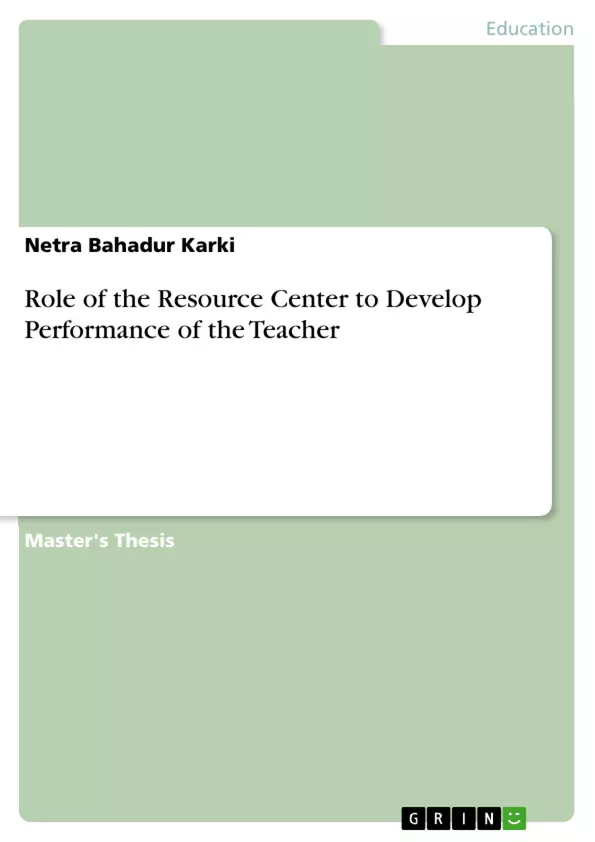The aim of the thesis entitled "Role of the Resource Center to Develop Performance of the Teacher" is to study the roles played by the resource centers in enhancing the performance of the teachers.
For this, three resource persons, eighteen Headmasters and thirty-two teachers are included in the questionnaire for the data collection. The Resource Centers were selected through purposive sampling and the teachers were selected through random sampling technique. During the research, George Elton Mayo's Human Relation Theory, Mary Parker Follett's Principles of Coordination and Abraham Harold Maslow's Theory of Motivation were utilized as the theoretical framework. The collected data were analyzed, described and presented with the help of tabulation, pie charts and percentage.
In this study, it was revealed that the inspection service could not reach to all the schools. The teachers and the resource persons discuss very less on the subject matter. Good human relation between the resource person and the teachers could not be maintained as per the Human Relation Theory of Mayo. Teachers could not be coordinated and motivated for their profession as per the Principles of Coordination of Follett. The Resource Centers have been conducting the professional development trainings, curriculum sensitization, trainings on the construction and use of teaching aids etc. for developing performance of the teachers. Presently, the Resource Centers have been facing problems like lack of financing, lack of trainings for the Resource Persons, lack of subject wise Resource Persons, lack of assistant personnel and so on.
Frequently asked questions
What is the title of this document?
Role of the Resource Center to Develop Performance of the Teacher.
Who is the author of this document?
Netra Bahadur Karki
What is the document about?
The document appears to be a thesis or research paper focusing on the role of resource centers in developing teacher performance in Nepal. It covers various aspects, including acknowledgement, abstract, table of contents, data analysis, findings, conclusion, recommendations and more.
What are some of the key themes and topics covered in the document?
Some key themes include:
- The role of resource centers (RCs) in enhancing teacher performance
- School inspection and supervision
- Community mobilization
- Activities carried out by RCs (e.g., training, workshops)
- Problems faced by RCs (e.g., lack of funding, political interference)
- Recommendations for improving the effectiveness of RCs
- Theoretical Framework George Elton Mayo's Human Relation Theory Mary Parker Follett's Principles of Coordination Abraham Harold Maslow's Theory of Motivation
What research methodologies were used in this study?
The research utilized both qualitative and quantitative data collection methods, including questionnaires for resource persons, headmasters, and teachers. Purposive and random sampling techniques were used to select participants.
What are some of the key findings of the study?
Some of the findings suggest that there is a need for more effective school inspection, improved communication between resource persons and teachers, increased financial support for resource centers, and reduced political interference in the education sector.
What are some of the recommendations made in the document?
The document recommends policy changes, such as formulating clear policies, providing professional training to the RPs and, increasing the amount of resources for them to facilitate effective school inspection and more.
Are there any limitations of the study mentioned in the document?
Yes, the study is limited to a specific geographical area (Morang district) and a limited number of participants. The findings may not be generalizable to other contexts.
What is BPEP?
According to the list of abbreviations, BPEP stands for Basic and Primary Education Plan.
What is DEO?
According to the list of abbreviations, DEO stands for District Education Office.
- Citar trabajo
- Netra Bahadur Karki (Autor), 2016, Role of the Resource Center to Develop Performance of the Teacher, Múnich, GRIN Verlag, https://www.grin.com/document/338568



